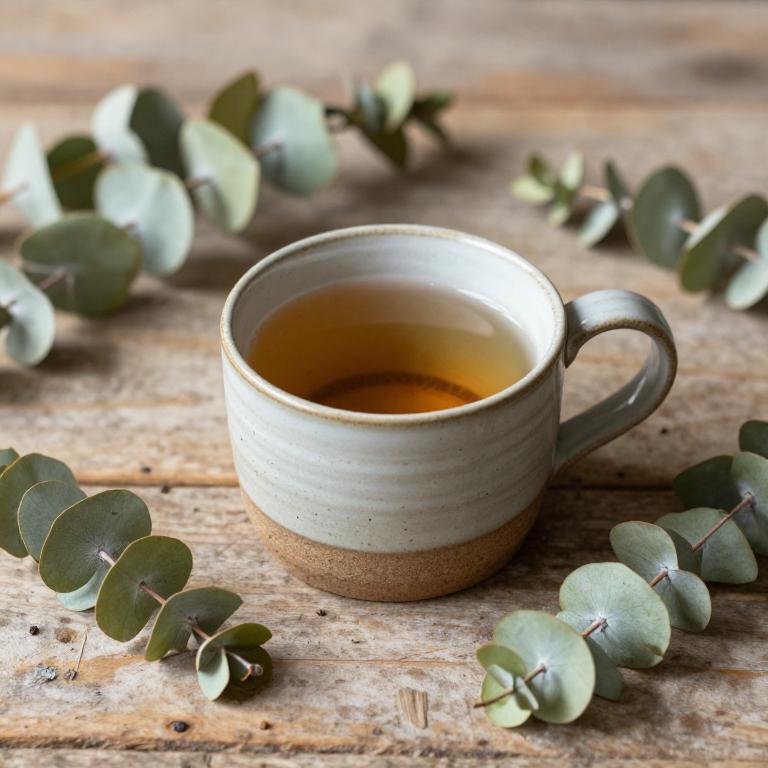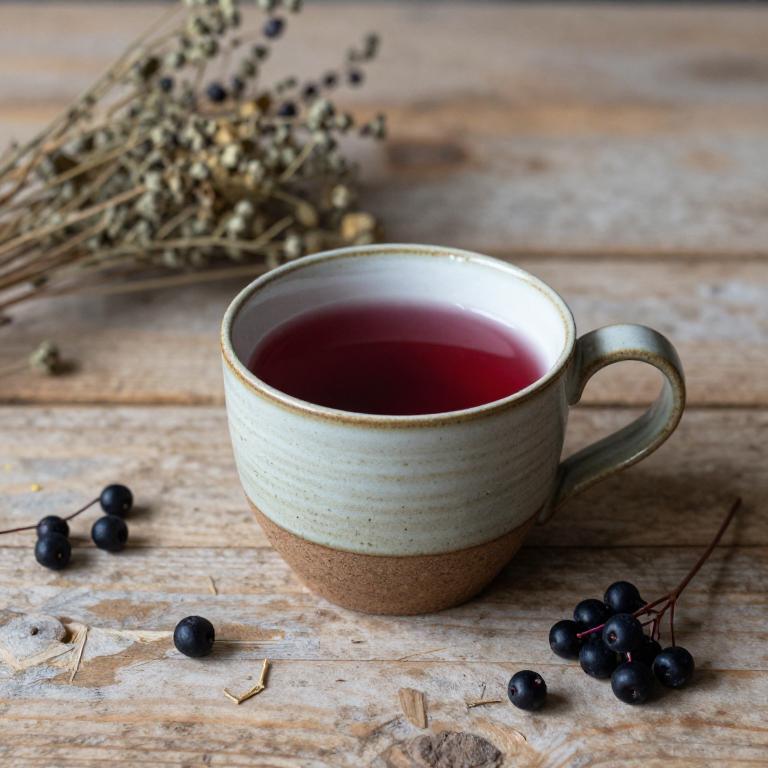10 Best Herbal Teas For Dry Cough

Herbal teas are a natural and effective remedy for alleviating symptoms of a dry cough, offering a soothing and gentle alternative to over-the-counter medications.
Common herbs used in these teas include licorice root, which has expectorant properties that help loosen mucus, and ginger, known for its anti-inflammatory and warming effects. Peppermint and eucalyptus are also frequently used for their ability to soothe the throat and ease respiratory discomfort. To prepare these teas, simply steep the dried herbs in hot water for several minutes, and drink them warm to maximize their soothing benefits.
While herbal teas are generally safe, it is advisable to consult a healthcare provider if the cough persists or is accompanied by other concerning symptoms.
Table of Contents
- 1. Eucalyptus (Eucalyptus globulus)
- 2. Thyme (Thymus vulgaris)
- 3. Chamomile (Matricaria chamomilla)
- 4. Ginger (Zingiber officinale)
- 5. Fennel (Foeniculum vulgare)
- 6. Peppermint (Mentha piperita)
- 7. Rosemary (Rosmarinus officinalis)
- 8. Stinging nettle (Urtica dioica)
- 9. Salvia (Salvia officinalis)
- 10. Black elderberry (Sambucus nigra)
1. Eucalyptus (Eucalyptus globulus)

Eucalyptus globulus, commonly known as Australian eucalyptus, is often used in herbal teas to alleviate symptoms of dry cough due to its expectorant and anti-inflammatory properties.
The essential oils in eucalyptus leaves, particularly cineole, help to loosen mucus and soothe irritated airways, making it effective for clearing congestion. When brewed as a tea, eucalyptus globulus can provide a calming effect while reducing throat irritation and easing breathing. It is typically consumed warm, often combined with other herbs like thyme or licorice root for enhanced relief.
However, it is important to consult a healthcare provider before use, especially for children, pregnant women, or individuals with existing health conditions.
2. Thyme (Thymus vulgaris)

Thymus vulgaris, commonly known as thyme, is a popular herb used in herbal teas to alleviate symptoms of dry cough due to its antispasmodic and expectorant properties.
The essential oils in thyme, particularly thymol, help to loosen mucus and reduce throat irritation, making it effective for soothing a persistent dry cough. When brewed as a herbal tea, thyme can be consumed warm to provide a comforting and calming effect on the respiratory system. It is often combined with other herbs like licorice root or eucalyptus to enhance its effectiveness.
However, it is important to consult a healthcare provider before using thyme tea, especially for individuals with allergies or those taking medications.
3. Chamomile (Matricaria chamomilla)

Matricaria chamomilla, commonly known as chamomile, is a popular herbal tea used to soothe dry coughs due to its mild sedative and anti-inflammatory properties.
The tea contains compounds like apigenin, which can help reduce throat irritation and ease coughing spasms. It is often recommended as a natural remedy for nighttime coughing, as it can promote relaxation and improve sleep quality. Chamomile tea is easy to prepare, simply by steeping dried flowers in hot water, and is generally safe for most adults when consumed in moderation.
However, individuals with allergies to plants in the daisy family should avoid it, and it is advisable to consult a healthcare provider before using it for persistent or severe cough symptoms.
4. Ginger (Zingiber officinale)

Zingiber officinale, commonly known as ginger, is often used in herbal teas to alleviate symptoms of dry cough due to its anti-inflammatory and soothing properties.
The active compounds in ginger, such as gingerol and shogaol, help reduce irritation in the throat and ease coughing spasms. When brewed into a warm tea, ginger can provide a comforting and aromatic remedy that supports respiratory health. To prepare the tea, fresh or dried ginger root is typically sliced and steeped in hot water for several minutes.
Regular consumption of ginger tea may offer natural relief for persistent dry coughs, though it is advisable to consult a healthcare professional for persistent or severe symptoms.
5. Fennel (Foeniculum vulgare)

Foeniculum vulgare, commonly known as fennel, is a popular herb used in herbal teas to alleviate symptoms of a dry cough.
The essential oils in fennel, particularly anethol, have expectorant and antispasmodic properties that help loosen mucus and reduce throat irritation. When brewed into a tea, fennel can soothe the respiratory tract and ease coughing fits, making it a gentle remedy for adults and children alike. It is often combined with other herbs like licorice or ginger to enhance its effectiveness.
However, it is important to consult a healthcare professional before using fennel tea, especially for prolonged periods or in individuals with known allergies or medical conditions.
6. Peppermint (Mentha piperita)

Mentha piperita, commonly known as peppermint, is a popular herb used in herbal teas to alleviate symptoms of dry cough.
The essential oils in peppermint, particularly menthol, have expectorant and antispasmodic properties that help soothe irritated airways and reduce coughing fits. Peppermint tea can also help ease throat irritation and promote relaxation, making it a comforting remedy for nighttime coughing. Its refreshing taste makes it an enjoyable and natural alternative to over-the-counter cough medications.
When consumed regularly, peppermint herbal tea may provide gentle relief and support overall respiratory health.
7. Rosemary (Rosmarinus officinalis)

Rosmarinus officinalis, commonly known as rosemary, is a popular herb used in herbal teas to alleviate symptoms of dry cough.
The essential oils in rosemary, such as cineole and camphor, have expectorant and anti-inflammatory properties that help loosen mucus and reduce irritation in the throat. Drinking rosemary tea can soothe the respiratory system and provide a calming effect, making it a natural remedy for persistent dry cough. To prepare the tea, steep fresh or dried rosemary leaves in hot water for several minutes.
While rosemary tea is generally safe, it is advisable to consult a healthcare professional before use, especially for individuals with existing health conditions or those taking medications.
8. Stinging nettle (Urtica dioica)

Urtica dioica, commonly known as stinging nettle, has been traditionally used in herbal medicine for its potential respiratory benefits.
When prepared as a herbal tea, stinging nettle may help soothe dry coughs by reducing inflammation in the airways and promoting mucus clearance. The tea is made by steeping dried nettle leaves in hot water, and it is often consumed several times a day for best results. It is important to note that while stinging nettle is generally safe, it may cause mild irritation in some individuals and should be used with caution, especially during pregnancy or with certain medical conditions.
As with any herbal remedy, it is advisable to consult a healthcare professional before use, particularly if the cough persists or is accompanied by other symptoms.
9. Salvia (Salvia officinalis)

Salvia officinalis, commonly known as sage, has been traditionally used in herbal teas to alleviate symptoms of dry cough due to its anti-inflammatory and antimicrobial properties.
The leaves of the plant contain compounds such as thujone and rosmarinic acid, which may help reduce throat irritation and suppress coughing. To prepare sage tea for a dry cough, steep a teaspoon of dried sage leaves in hot water for several minutes, then strain and drink slowly. Regular consumption of sage tea may provide soothing relief and support respiratory health.
However, it is advisable to consult a healthcare professional before using sage, especially for prolonged periods or in combination with other medications.
10. Black elderberry (Sambucus nigra)

Sambucus nigra, also known as European elderberry, is commonly used in herbal teas to help alleviate symptoms of a dry cough.
The plant contains compounds such as flavonoids and antioxidants that may help reduce inflammation in the respiratory tract and soothe irritation. Herbal teas made from elderberry are often prepared by steeping dried berries or leaves in hot water, and they can be consumed several times a day for relief. While generally considered safe in moderate amounts, it is important to consult a healthcare provider before using elderberry tea, especially for prolonged periods or in combination with other medications.
Some studies suggest that elderberry may support immune function, which could indirectly help in managing persistent dry coughs.